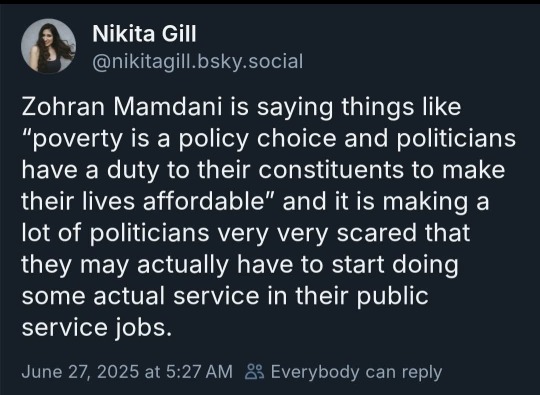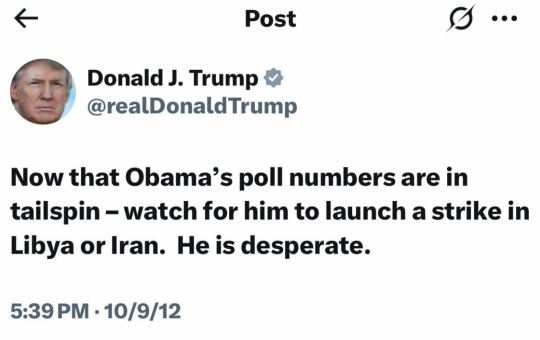An Iris Blog. I need someplace to put the subjects that will taint any good contained in my other blogs. At least for the next four years.
Don't wanna be here? Send us removal request.
Text
June 27, 2025
HEATHER COX RICHARDSON
JUN 28
READ IN APP
After the Supreme Court today decided the case of Trump v. CASA, limiting the power of federal judges to issue nationwide injunctions, President Donald Trump claimed the decision was a huge victory that would permit him to end birthright citizenship, that is, the principle that anyone born in the United States, with very limited exceptions, is a U.S. citizen. To reporters, he claimed: “If you look at the end of the Civil War—the 1800s, it was a very turbulent time. If you take the end day—was it 1869? Or whatever. But you take that exact day, that’s when the case was filed. And the case ended shortly thereafter. This had to do with the babies of slaves, very obviously.”
This is a great example of a politician rooting a current policy in a made-up history. There is nothing in Trump’s statement that is true, except perhaps that the 1800s were a turbulent time. Every era is.
The Fourteenth Amendment that established birthright citizenship came out of a very specific moment and addressed a specific problem. After the Civil War ended in 1865, former Confederates in the American South denied their Black neighbors basic rights. To try to remedy the problem, the Republican Congress passed a civil rights bill in 1866 establishing “[t]hat all persons born in the United States and not subject to any foreign power, excluding Indians, not taxed, are hereby declared to be citizens of the United States; and such citizens of every race and color…shall have the same right[s] in every State and Territory in the United States.”
But President Andrew Johnson, who was a southern Democrat elected in 1864 on a union ticket with President Abraham Lincoln, a Republican, vetoed the 1866 Civil Rights Bill. While the Republican Party organized in the 1850s to fight the idea that there should be different classes of Americans based on race, Democrats tended to support racial discrimination. In that era, not only Black Americans, but also Irish, Chinese, Mexican, and Indigenous Americans, faced discriminatory state laws.
In contrast to the Democrats, Republicans stated explicitly in their 1860 platform that they were “opposed to any change in our naturalization laws or any state legislation by which the rights of citizens hitherto accorded to immigrants from foreign lands shall be abridged or impaired; and in favor of giving a full and efficient protection to the rights of all classes of citizens, whether native or naturalized, both at home and abroad.”
When Republicans tried to enshrine civil rights into federal law in 1866, Johnson objected that the proposed law “comprehends the Chinese of the Pacific States, Indians subject to taxation, the people called Gipsies, as well as the entire race designated as blacks,” as citizens, and noted that if “all persons who are native-born already are, by virtue of the Constitution, citizens of the United States, the passage of the pending bill cannot be necessary to make them such.” And if they weren’t already citizens, he wrote, Congress should not pass a law “to make our entire colored population and all other excepted classes citizens of the United States” when 11 southern states were not represented in Congress.
When Congress wrote the Fourteenth Amendment to the Constitution, it took Johnson’s admonition to heart. It did not confer citizenship on the groups Johnson outlined; it simply acknowledged that the Constitution had already established their citizenship. The first sentence of the Fourteenth Amendment reads: “All persons born or naturalized in the United States, and subject to the jurisdiction thereof, are citizens of the United States and of the State wherein they reside.”
In the short term, Americans recognized that the Fourteenth Amendment overturned the 1857 Dred Scott v. Sandford decision, in which the Supreme Court ruled that people of African descent “are not included, and were not intended to be included, under the word ‘citizens’ in the Constitution, and can therefore claim none of the rights and privileges which that instrument provides for and secures to citizens of the United States.” The Fourteenth Amendment established that Black men were citizens.
But the question of whether the amendment recognized birthright citizenship for all immigrants quickly became an issue in the American West, where white settlers were not terribly concerned about Black Americans—there were only 4,272 Black Americans in California in 1870, while there were almost half a million white Americans—but wanted no part of allowing Chinese men to be part of American society.
Western state legislatures continued to discriminate against Asian immigrants by falling back on the country’s early naturalization laws, finalized in 1802, to exclude first Chinese immigrants and then others from citizenship. Those laws were carefully designed to clarify that Afro-Caribbeans and Africans—imported to be enslaved—would not have the same rights as Euro-Americans. Those laws permitted only “free white persons” to become citizens.
In the late nineteenth century, state and territorial legal systems kept people of color at the margins, using treaties, military actions, and territorial and state laws that limited land ownership, suffrage, and intermarriage.
As late as 1922, in the case of Takao Ozawa v. United States, the Supreme Court ruled that Takao Ozawa, born in Japan, could not become a citizen under the 1906 Naturalization Act because that law had not overridden the 1790 naturalization law limiting citizenship to “free white persons.” The court decided that “white person” meant “persons of the Caucasian Race.” “A Japanese, born in Japan, being clearly not a Caucasian, cannot be made a citizen of the United States,” it said.
The next year, the Supreme Court decision in United States v. Bhagat Singh Thind upheld the argument that only “free white persons” could become citizens. In that case, the court said that Thind, an Indian Sikh man who identified himself as Indo-European, could not become a U.S. citizen because he was not a “white person” under U.S. law, and only “free white persons” could become citizens. After the Thind decision, the United States stripped the citizenship of about 50 South Asian Americans who had already become American citizens.
Those discriminatory laws would stand until after World War II, when U.S. calculations of who could be a citizen shifted along with global alliances and Americans of all backgrounds turned out to save democracy.
But despite the longstanding use of laws designed to perpetuate human enslavement to prevent certain immigrants from becoming citizens, the Supreme Court always upheld the citizenship of their children. In 1882, during a period of racist hysteria, Congress passed the Chinese Exclusion Act agreeing that Chinese immigrants could not become citizens.
Wong Kim Ark was born around 1873, the child of Chinese parents who were merchants in San Francisco. In 1889 he traveled with his parents when they repatriated to China, where he married. He then returned to the U.S., leaving his wife behind, and was readmitted. After another trip to China in 1894, though, customs officials denied him reentry to the U.S. in 1895, claiming he was a Chinese subject because his parents were Chinese.
Wong sued, and his lawsuit was the first to climb all the way to the U.S. Supreme Court, thanks to the government’s recognition that with the U.S. in the middle of an immigration boom, the question of birthright citizenship must be addressed. In the 1898 U.S. v. Wong Kim Ark decision, the court held by a vote of 6–2 that Wong was a citizen because he was born in the United States.
Immigration scholar Hidetaka Hirota of the University of California, Berkeley, explains that the government went even further to protect children born in the U.S. In 1889 the Treasury Department—which then oversaw immigration—decided that a native-born child could not be sent out of the country with her foreign-born mother. Nor did the government want to hurt the U.S. citizen by expelling her mother and leaving her without a guardian. So it admitted the foreign-born mother to take care of the citizen child.
The Treasury concluded that it was not “the intention of Congress to sever the sacred ties existing between parent and child, or forcibly banish and expatriate a native-born child for the reason that its parent is a pauper.”
In May 2023, then–presidential candidate Donald J. Trump released a video promising that on “Day One” of a new presidential term, he would issue an executive order that would end birthright citizenship. He claimed that the understanding that anyone born in the United States is automatically a citizen is “based on a historical myth, and a willful misinterpretation of the law by the open borders advocates.”
It is actually a historical myth and a willful misinterpretation of the law that the Civil War ended in 1869, that birthright citizenship came out of a case filed on that exact day, and that the “case” was “very obviously” about “the babies of slaves.” But there were indeed echoes of the past in the administration’s position on immigration today. The administration's announcement that it is terminating Temporary Protected Status for half a million Haitians, stripping them of their legal status, seems to echo the ancient laws saying only “free white persons” can become citizens.
—
8 notes
·
View notes
Text

Poverty IS a policy choice. Don't let anyone tell you otherwise.
3K notes
·
View notes
Text
The U.S. Supreme Court decided the case involving birthright citizenship in the country for any migrants coming into the country who have a child on American soil. The U.S. Constitution says that any person born in the U.S. is considered an American.
62 notes
·
View notes
Text
I can't imagine any voice more grating than that of the current squatter in the whitehouse.
And also...shouldn't a "leader" of a country be mature enough to refrain from name-calling?
Sara Boboltz at HuffPost:
President Donald Trump labeled New York City’s Democratic mayoral nominee a “100% Communist Lunatic” on Wednesday, one day after Zohran Mamdani clinched the primary. “It’s finally happened, the Democrats have crossed the line,” Trump wrote on Truth Social. “Zohran Mamdani, a 100% Communist Lunatic, has just won the Dem Primary, and is on his way to becoming Mayor. We’ve had Radical Lefties before, but this is getting a little ridiculous,” the president said. Mamdani’s victory came as a surprise to many who watched disgraced former Gov. Andrew Cuomo lead in the polls for months. Cuomo had the backing of tech executives and billionaires, including the richest woman in the world, but Mamdani found success with his grassroots approach. He argues that the city has become far too expensive for regular people to rent apartments and buy groceries, and offers policies to lower the cost of living. Trump assaulted Mamdani’s appearance, saying the 33-year-old “looks TERRIBLE” and “his voice is grating” before going on to call out other frequent targets of his derision. ″[H]e’s not very smart, he’s got AOC+3, Dummies ALL, backing him, and even our Great Palestinian Senator, Cryin’ Chuck Schumer, is groveling over him. Yes, this is a big moment in the History of our Country!” Trump said.
The only lunatic is you, Donald Trump, NOT Zohran Mamdani.
#the thing in the whitehouse#petulant child#grade schoolers behave better#definitely not diplomat#fuck trump#fuck maga#fuck anyone who likes this guy#bad example
8 notes
·
View notes
Text

Do not think for a moment that this admin is only going after trans folks. They are ultimately going after the whole LGBTQ community. They start small, like getting rid of a hotline option, then go BIG.
19K notes
·
View notes
Text
i don’t know how to explain to you people that no matter what a country’s government is like i do not and will not support the US indiscriminately bombing that country’s civilians and i don’t know why that’s a controversial take tbh
57K notes
·
View notes
Text
🇺🇸massive recall of food, baking ingredients, and cosmetics due to insanitary conditions, filth, and rat shit contamination🇺🇸
over 150 items being recalled, including some intended for babies. the FDA warns that all products held or distributed by this company may be dangerous.
this recall is so bad that you need to clean and sanitize anything that has even touched the outside of these products.
the recall link may move in the future. this recall has its own special FDA page right now because the FDA issued an advisory immediately after inspection, before a recall could even be issued. the findings of the inspection were just THAT fucking disgusting.

June 3, 2025 On May 27, 2025, Pan-African Food Distributors initiated a recall of various products it sells. FDA continues to have concerns for all products held and distributed by Pan-African Food Distributors due to the insanitary conditions observed at the facility during a routine FDA inspection, including a rodent infestation and numerous rodent droppings on multiple product containers. FDA is advising consumers and retailers not to use, eat, sell, or serve cosmetic and food products distributed by Pan-African Food Distributors of Louisville, Kentucky. FDA is working with the firm and their direct customers to remove all products of concern from the market. More information will be provided in this alert as it becomes available.
some emphasis mine.
the distribution center was inspected, the FDA found a massive rodent infestation, and they shut that shit down. literally, they found a ton of rodent shit all over the products. although the distribution center is in kentucky, these products may have been distributed nationwide.
pan-african food distributors is also doing business as (dba) east africa boutique, LLC.
the FDA says more updates will be issued about this. because this one is a big deal.
Products held under insanitary conditions and contaminated with filth could pose a serious health risk, potentially leading to various illnesses, including leptospirosis, hantavirus infection, salmonellosis, yersiniosis, E.coli infection, and rat-bite fever. People should contact their healthcare provider if they suspect they have developed symptoms as a result of eating or using these products.
some emphasis mine.
the risks here are varied and bad. bad bad. bad and potentially deadly. if you have used or eaten or even held these products and experience symptom, GO TO A DOCTOR!
Consumers should check their homes for food and cosmetic products distributed by Pan-African Food Distributors and discard all products. If you do not know if your product was distributed by Pan-African Food Distributors, throw it away. Additionally, consumers should carefully clean and sanitize surfaces that could have come in contact with potentially contaminated products.
clean and sanitize ANYTHING these products have touched!!! if you are not sure if your item is part of this recall, the FDA says the risks here are so bad that you should just throw it away!
recalled items include baby food, baking ingredients, various types of flours, soaps, shampoo, lotion, baby powder, and so much more. this list contains over 150 recalled items. so check under the cut for the list, or visit the link at the top of this post.
formatted in
product name - lot code/batch (when listed) - expiration date (when listed)
recalled food items:
Super Sembe Maize Flour (10 kg) May 2025
Kinazi - Cassava Flour Lot Code: 002952 04 OCT 2026
Cassava FuFu (10 Kg) 2024-2026
Cassava FuFu (20 Kg)
Farina 1 (50 lb.) Lot Code: 506602
Peanut Flour (50 lb.) 01 FEB 2026
Akanozo (12 x1 cases) Lot: F50FA048
Huza – Fermented Sorghum (1 kg) 21 DEC 2025 and 25 APR 2025
Nootri Family 04/04/2025, and 05/04/2025, 6/10/2025
Nootri Baby Lot: CIBK240329 20/09/2025
Nootri Toto Lot: CPI240411 03/10/2025
Red Sorghum Flour 01 Jan 2026
Mixed Porridge Flour 01 Jan 2026
Soybean Flour 01 Jan 2026
Akenza – Dried Ground Cassava leaves
Akanozo – Wheat Flour (1 kg) Batch# SDFA431 25 APR 26
Akanozo – Soybean Flour Batch # K5YFA 20 APR 2025
Akanozo – Sorghum Flour Lot Code: SDFA434 11 AUG 2026
Akanozo – Composite Flour Lot Code: COFA788 13 AUG 2026
Akanozo – Roasted Wheat Flour Batch # RWHFA013 14 AUG 2026
Huza – Millet Flour May 27, 2025
Akanozo – Fine Millet Flour (1 kg) Batch # MIFA578 10 AUG 2026
Akanozo – Composite Flour Batch # COFA788 13 AUG 2026
Huza – Wheat Flour 05 06 2025
Super Cereal Plus – Fortified Corn Soya Blend Batch #: 07BBE02/2026, 11BBE08/2026
Pan African Foods Distribution Inc – White Corn Flour (10 kg): 04/04/2027
Sujata – Multi grains flour 13 SEP 2025
Akanoze Fou Fou 10 SEP 2026
F. Garcia Corn Meal 10/2025
Pan African Foods Distribution Inc – White Corn Flour 04/01/2027
Pan African Foods Distribution Inc – Beans 05/2026
recalled cosmetics:
Dover-Elegance Skin Lightening Cream 03/2026
Roberts Glycerine 03/2027
Movit- Baby Oil 03/2026
Movit- Body Cream 03/2026
Dudu-osun-Black Soap (no expiry Date or lot information)
Super Curl Activator Gel (no expiry Date or lot information)
Movit-Curl Activator Gel 01/2027
Sleeping Baby-Perfumed Petroleum Jelly 20/10/2026
Movit-Jelly 200g 0059J16 02/2028
Movit-Jelly 425g 021PJ17, 009PJ01, 03/2028, 02/2028
Movit-Shampoo 1-L 020N526 12/2026
Gel 018HJ30 02/2028
Movit-Baby Junior Petroleum 200g 022J1327 01/2025
Movit-Baby Junior Petroleum 425g 013J1318 02/2028
Movit-Miss Beauty Glycerin 008W24 01/2027
Movit Curling Hair Lotion 003CC20 01/2027
Setting Hair Lotion 0025 C16 01/2027
Sleeping Baby-Baby Oil (no expiry or lot information)
Movit Radiant Hair Vitalizer 009RHV03 01/2028
Sante-Petroleum Jelly 09/2026
Claire-Cocoa Butter Lotion 02/04/26
Claire-Body Milk 24/04/26
Black Pearl Powder Hair Dye (no expiry or lot information)
Nina Family-Soap 04/2029
Sousana Glycerine 15/01/2026
Imperial Leather-Lotion Active 02/2026
Imperial Leather-Lotion Japanese Spa 04/2026
Imperial Leather-Lotion Uplifting 01/2027
Mama Bebe Jelly 05/2027
Sante Pure-Petroleum Jelly 200g 21/12/26
Sante Pure-Petroleum Jelly 100g 08/2024
Sante Pure-Petroleum Jelly 250g 05/2027
Claire-Talcum Powder 19/04/2026
Imperial Leather Bath Soap (no expiry or lot information)
Imperial Leather-Lotion 04/2026
Sousana Glycerine 17/04/26
Sante-Soap 04/2029, 11/2028
American Dream Cocoa Butter Cream 500ml 02/2026
Claire Cream 04/2026
Vague-Liquid Wash 26/03/26
Sousana-Glycerine Cream 25/03/26
Zote-Pink Soap 11734624300
Malaika Petroleum Jelly 23/04/2027
Sleeping Beauty-Perfumed Petroleum Jelly 500g 3/2/27
Sleeping Beauty-Perfumed Petroleum Jelly 250g 7/11/26
Family Care-Perfumed Petroleum Jelly 500g 03-2029
Sleeping Beauty-Perfumed Petroleum Jelly, mixed sizes Jan 2027
Sleeping Baby – Jelly: BATCH DATE: OCT 2024
Paw Paw – Clarifying Cream (300 mL) 24271 04/2027
Femco Sarl – Cream (no expiry or lot information)
Malaika – Cream (200 mg) 24271 04/2027
Mama Bebe – Baby Jelly 24198 05/2027
Epiderm-Cream (15 g) 04/2027
Aboniki Balm AB0324J
Rico-Clair Plus L112301
Movit Hair Spray 001M5504
Movit Hair Food 031AH01
Pure White Cream AABC
Uniparco – Cosmetic Gold Lotion CCAB 13/01/2026
BB Clear Lightening Cream 320 ml 01/12/2026
BB Clear Lotion 300 ml
Natures Secrete Soap 06 06 30 01/12/2026
Movit Baby Powder 01/2026
Clinic Clear Cream Jar 330 gr 12/2024
Clinic Clear Lotion 500 ml
Clinic Clear Oil 125 ml
Clinic Clear Soap 225 g
Diprosom Cream 03/2025
Sexy Body Powder Perfume 04/2025
Movit Hair Lotion 12/2025
Movit Nail Polish Removal 03/2024
Clinic Clear Soap 04/2026
Dettol Soap 02/2025, 07/2025
Movit – Lemon Crème 05/2026
Neoprosone Gel 03/2025
Caratone Oil 11/2024
Caratone Cream C047152
Caratone Brightening Soap 02/2029
Caratone Crème Clarifionte 06/2027
Caratone Lotion 10/2027
Clear Therapy Purete 07/2027
Body Luxe Body Cream 11/2025
Body Luxe Body Cream 02/2026
Dettol Glycerine Soap 09/2026
Dettol Liquid Soap 03/2026
Family Care Petroleum Jelly 12/2028
Sleeping Baby – Baby Powder 08/11/2026
Movit – Hair Food 06/2026
Paw Paw Shower Gel 08/2026
Vaseline Blue Seal 13 09 2026
Caro White-Coconut Oil 05/2029
Caro White-Tube Cream 01/2025
Caro White-Cream 11/2026
Caro White-Body Lotion 02/2027
White Secrete – Lightening Body Cream 09/2027
Amara Lotion 06/2028
White Secrete Lotion 03/2027
White Secrete Body & Face Lotion 03/2027
White Secrete Oil 04/2027
White Secrete Serum 10/2026
Hemani Black Seals Oil 01/2026
Carotone Gift Pack 05/2027
Radiant-Hair Spray 02/2028
Movit Petroleum Jelly 02/2028
Radiant Shampoo 12/2025
Radiant Hair Vitalization (no expiry or lot information)
Salima 09/2025
African Black Soap (no expiry or lot information)
Lebidjanaise – Toilet Soap 08/2026
Perle Clair Cream 14/03/2026
Clairman Soap 05/2028
Coco pulp Soap 13/09/2026
Rinju-Lotion 04/2026
Cantu Oil
Claire Men 03/2025
BioClaire Cream (no expiry or lot information)
Remy Lotion 09/2027
Huile De Beaute 04/2023
Rinju-Body and Hand Cream 07/2027
Razac Hand and Body Lotion 08/2027
only items related to pan-african food distributors inc/east africa boutique LLC are being recalled. if you have these types of items and know for sure that they came from another distributor, they are not part of the recall. but again, this is so fucking dangerous that if you are unsure, throw it out and clean and sanitize everything that touched the inside or outside of these products.
also note: as mentioned at the top, this recall may have its link moved, and will likely at least have an additional link for the recall. what the FDA found was so fucking disgusting that they actually issued a special advisory before the recall was initiated.
this post may be updated in the future, either under the read more or in reblogs, as new information comes out. if you want to keep up with this, bookmark the recall link and/or check the notes every now and then!
stay safe and take care!
18K notes
·
View notes
Text

It's wonderful that Jeff Bezos has found love — but see the problem here?
1K notes
·
View notes
Text

There's always a video, or a Tweet...
23 notes
·
View notes
Text
just saying i prefer my food-based crimes to be more "heisting $1 million worth of syrup from the Canadian Maple Syrup Reserve" and less "corporations giving toddlers listeria for fun and profit"
3K notes
·
View notes
Text
June 23, 2025
HEATHER COX RICHARDSON
JUN 24
READ IN APP
In a timeline of Trump’s decision to drop 12 of the reportedly 20 Massive Ordnance Penetrator bombs the U.S. military possessed on Iran, New York Times reporters confirmed what Josh Marshall of Talking Points Memo judged from the beginning: Trump wanted in on the optics of what seemed to be Israel’s successful strikes against Iran.
Andrew Perez and Asawin Suebsaeng of Rolling Stone reported conversations with administration officials who confirmed there was no new intelligence to suggest Iran was on the brink of producing nuclear weapons.
Mark Mazzetti, Jonathan Swan, Maggie Haberman, Eric Schmitt, and Helene Cooper reported yesterday in the New York Times that Trump had warned Israeli prime minister Benjamin Netanyahu against striking Iran but changed his mind after seeing how Israel’s military action was “playing” on television. The reporters write: “The president was closely monitoring Fox News, which was airing wall-to-wall praise of Israel’s military operation and featuring guests urging Mr. Trump to get more involved.”
Trump began to hint he had been part of the operation, and military advisors began to draw up plans for a strike. According to the reporters, by June 17—three days after his military parade had fizzled and more than 5 million Americans had turned out to protest his administration—Trump had decided to bomb Iran.
Rather than keeping the mission quiet, Trump issued increasingly aggressive social media posts appearing to hint at a strike. David E. Sanger of the New York Times cited reports from Israeli intelligence saying that Iranian officials had removed 400 kilograms (about 880 pounds) of enriched uranium from the Fordo enrichment plant to another nuclear complex, although at least some equipment and records would likely have remained there.
Republicans have talked about bombing Iran to stop its nuclear aspirations since the early 2000s, but the relationship between the U.S. and Iran relating to nuclear technology actually reaches back to 1953. In that year, under President Dwight D. Eisenhower, the Central Intelligence Agency (CIA) and the United Kingdom supported a coup against the elected Iranian prime minister, Mohammad Mosaddegh, after he called for the nationalization of the Anglo-Iranian Oil Company, in which British interests controlled a majority stake.
In his place, the former leader of the country, Mohammad Reza Shah, retook power. In 1954, Iran accepted a 25-year agreement that gave western oil companies 50% ownership of Iran’s oil production.
At the same time, President Eisenhower proposed trying to defang international fears of nuclear war by shifting nuclear technologies toward civilian uses, including energy. On December 8, 1953, he spoke before the General Assembly of the United Nations in New York City on how atomic energy could be used for peaceful ends. The initiative, known as “Atoms for Peace,”
provided reactors, nuclear fuel, and training for scientists for countries that promised they would use the technology only for peaceful civilian purposes.
In 1967 the U.S. supplied a nuclear reactor and highly enriched uranium to Iran, and trained Iranian scientists in the United States. In 1974, according to Ariana Rowberry of the Brookings Institution, the shah announced he intended to build 20 new reactors in the next 20 years.
Then, in 1979, the Islamic revolution in Iran forced out the shah and put Islamic leader Ayatollah Ruhollah Khomeini in power. In 1980, after the U.S. admitted the shah into the country for cancer treatments, Iranian students stormed the U.S. embassy, taking 52 Americans hostage for 444 days. The U.S. cut diplomatic ties with Iran, imposed sanctions, froze Iranian assets in the U.S., and ended the civilian nuclear cooperation agreement with Iran.
Iran turned to Pakistan, China, and Russia to expand its nuclear program. Tensions between the U.S. and Iran increased until Republican politicians talked about bombing the sites of Iran’s nuclear program. Famously, Arizona senator John McCain joked about bombing Iran in 2007 when he was running for the Republican presidential nomination, singing “Bomb, bomb, bomb, bomb, bomb Iran” to the tune of the Beach Boys’ classic song “Barbara Ann.”
McCain lost the 2008 election to Democratic president Barack Obama, and in 2013 at the beginning of his second term, Obama began high-level talks to cap Iran’s enrichment of uranium that could be used for weapons. In 2015, forty-seven Republican senators, led by then freshman senator Tom Cotton of Arkansas, tried to blow up the talks, sending an open letter to Iranian officials to put them on notice that “the next president could revoke such an executive agreement with the stroke of a pen and future Congresses could modify the terms of the agreement at any time.”
This was an astonishing breach of the longstanding U.S. tradition of presenting a united front in foreign negotiations. Nonetheless, in 2015 the U.S., Iran, China, Russia, France, Germany, the United Kingdom, and the European Union signed the Joint Comprehensive Plan of Action (JCPOA) that limited Iran’s enriched uranium in exchange for the lifting of sanctions.
At about the same time, negotiators settled an unrelated case between the U.S. and Iran at The Hague, involving the return of American prisoners to the U.S. and Iranian assets frozen in the U.S. to Iran. Since Iran was cut off from international finance systems at the time, the U.S. returned some of those assets in 2016 as Swiss francs, euros, and other currencies. Donald Trump, who was then running for the presidency, insisted that the Obama administration had sent “pallets of cash” to Iran as part of a deal to free the prisoners. “Iran was in big trouble, they had sanctions, they were dying, we took off the sanctions and made this horrible deal and now they’re a power,” Trump told reporters.
Then, in 2016, voters put Trump in the White House. Although the nuclear deal appeared to be working, Trump left it in 2018, calling it a “horrible one-sided deal that should have never, ever been made.” Without the U.S. the agreement broke down. Iran resumed its program for enriching uranium.
A week and a half ago, on June 12, Israeli prime minister Benjamin Netanyahu launched strikes against Iran, and on June 21, Trump ordered strikes on three of Iran’s nuclear sites, claiming that after 40 years of Iranian hostility, “Iran's key nuclear enrichment facilities have been completely and totally obliterated.”
In fact, the effect of the strikes is not at all clear, although Trump insisted yet again this afternoon that “[o]bliteration is an accurate term!... Bullseye!!!”
Trump’s strikes on Iran underscore how Republican leaders see governance. They seemed to see the careful negotiations under Obama and the international inspections that certified Iran’s adherence to the JCPOA as signs of weakness, preferring simply to use American military might to impose U.S. will. Trump has combined that dominance ideology with his enthusiasm for performances that play well on television.
This afternoon, Iran responded to the U.S. strikes with its own missile attack on a U.S. military base in Qatar, after warning of the upcoming attack to enable Qatar to intercept the missiles.
Trump posted on social media: “Iran has officially responded to our Obliteration of their Nuclear Facilities with a very weak response, which we expected, and have very effectively countered. There have been 14 missiles fired—13 were knocked down, and 1 was ‘set free,’ because it was headed in a nonthreatening direction. I am pleased to report that NO Americans were harmed, and hardly any damage was done. Most importantly, they’ve gotten it all out of their ‘system,’ and there will, hopefully, be no further HATE. I want to thank Iran for giving us early notice, which made it possible for no lives to be lost, and nobody to be injured. Perhaps Iran can now proceed to Peace and Harmony in the Region, and I will enthusiastically encourage Israel to do the same. Thank you for your attention to this matter! DONALD J. TRUMP, PRESIDENT OF THE UNITED STATES OF AMERICA”
Ten minutes later, he posted: “CONGRATULATIONS WORLD, IT’S TIME FOR PEACE!”
Republican dominance politics began in the 1950s as a way to prevent the federal government from protecting Black and Brown civil rights. Since then, it has reinforced the idea of asserting power through violence. And it has always reinforced the power of white men over women and racial and gender minorities.
Today the U.S. Supreme Court granted the Trump administration's request to allow it to deport migrants to places other than their country of origin, often to countries plagued by violence. The administration has claimed this power as part of its campaign to scare immigrants from coming to the U.S. by demonstrating that they could end up in a third country with no recourse. The court majority did not explain its reasoning; the three liberal justices—Ketanji Brown Jackson, Elena Kagan, and Sonia Sotomayor—dissented sharply.
“In…earlier rulings, the court cleared the way for the government to treat as many as a million migrants as removable who previously weren’t,” legal analyst Steve Vladeck told Angélica Franganilla Díaz and John Fritze of CNN. “And today’s ruling allows the government to remove those individuals and others to any country that will take them—without providing any additional process beyond an initial removal hearing, and without regard to the treatment they may face in those countries.”
—
19 notes
·
View notes














